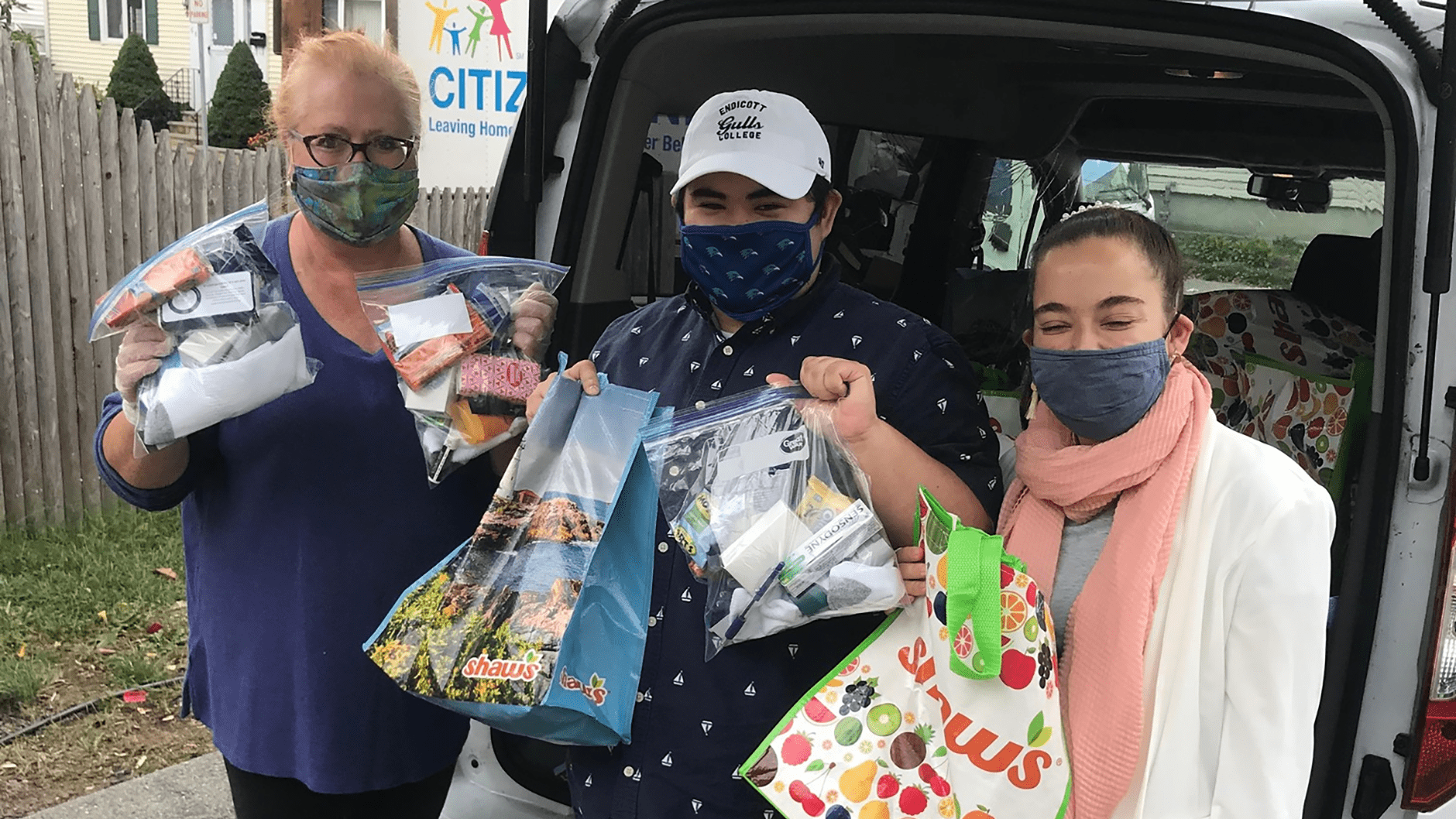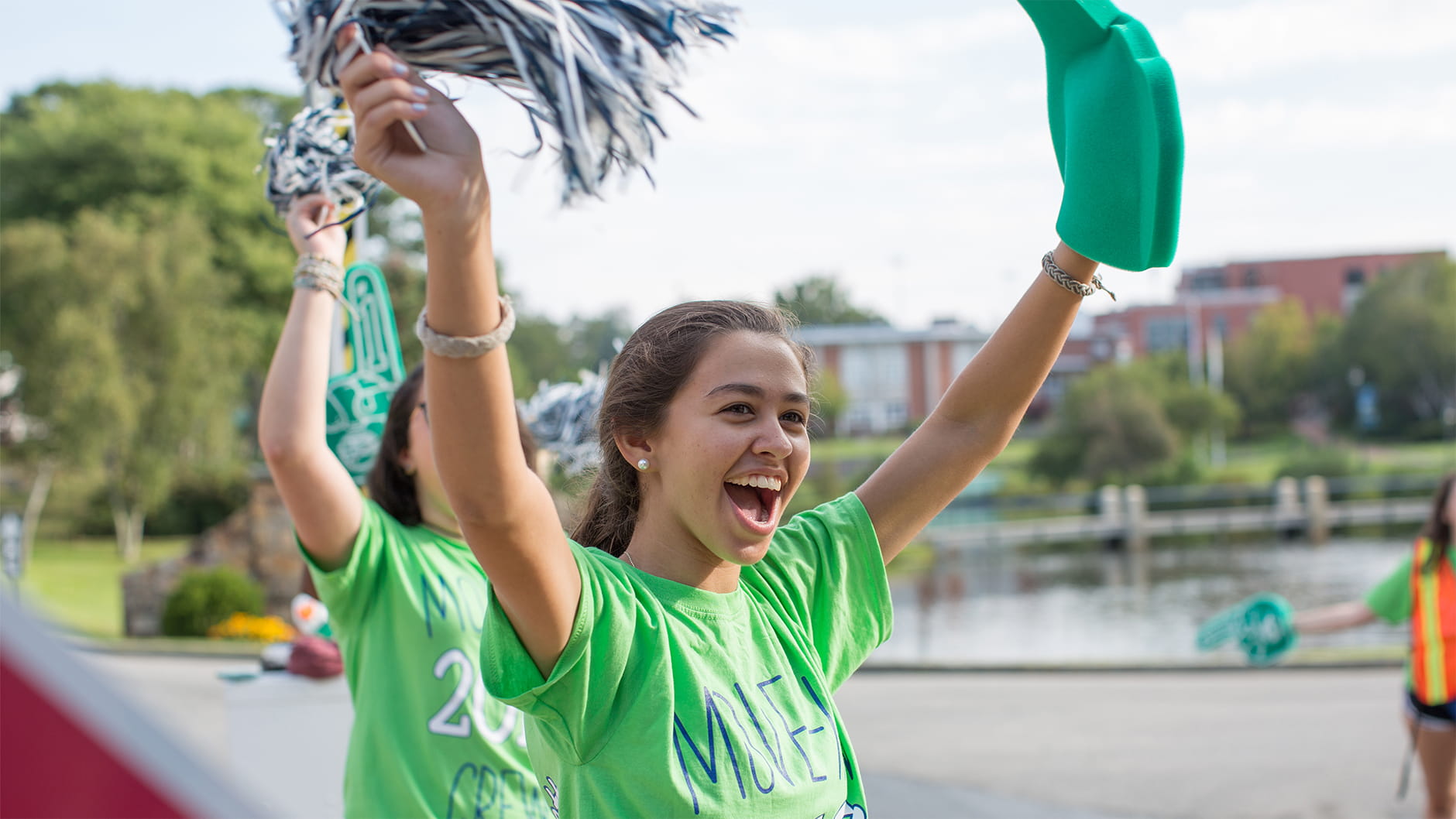Experiential learning is one of the fundamental building blocks of a student’s journey at Endicott College. Throughout their coursework, internships, and student activities on campus, students are encouraged to learn from their experiences and develop solutions and knowledge they will need in real-world scenarios. This past spring COVID-19 disrupted the lives of students, faculty, staff, and everyone around the globe. One of the many issues that came to light during this pandemic is food insecurity—throughout the globe, but more specifically locally on the North Shore.
Global Food Trends, a class for honors students held this past spring, had the very timely topic of food insecurity become a major theme of their final business projects. Co-taught by Professor Semahagn Abebe, Ph.D., from the School of Arts & Sciences and Dean Todd Comen, Ph.D., from the School of Hospitality Management, students learned about issues and opportunities for entrepreneurs, global supply chain challenges, and food systems and security. This entrepreneurial and interdisciplinary program is part of the new Food & Beverage Entrepreneurship concentration in the School of Hospitality Management and includes a non-profit management component in which students can customize their studies to focus on hunger and food security organizations. “In the Global Food Trends: Issues and Opportunities for Entrepreneurs Course, Students are introduced to a myriad of contemporary trends influencing food systems emphasizing on how entrepreneurs are designing and delivering innovative solutions to local and global food challenges. The most effective requirement of the course is the business plan project where students design a plan to solve a food insecurity problem focusing on the areas of production (including agriculture or food processing), distribution, or provisioning, which includes retail, grocery, restaurants, food shelves, and other consumer-facing services,” notes Abebe.
Since the pandemic upended social and economic activities, the food-insecurity rate in Massachusetts has increased 53% since before the pandemic, according to Feeding America. This means, one in seven people do not have access to enough food for three healthy meals a day, and one in five children in Massachusetts now live in food-insecure households, an increase of 81% over pre-COVID-19 food-insecurity levels.
“The students’ projects increasingly became very relevant when hunger and food insecurity grew rapidly across the world, and on the North Shore outside of Boston, hunger relief programs exceeded, in some instances, a 40% increase in demand from food-insecure residents. Global and local food supply chains were stretched thin, and food products such as beef, milk, vegetables, and grains were either in short supply or not able to get from farm to marketplace due to factors affecting the industrial food supply chain,” says Comen.
Tackling Food Insecurity Doesn’t Just Happen in the Classroom
Sam Dorgan ’21 is a Hospitality Management student interning with the Office of Community Service at the College. Dorgan is excited about the opportunity to work in community service and he is very passionate about helping others. "Interning with the Office of Community Service has allowed me to help others, especially during COVID-19 when the demand for volunteers to help with donations and getting food to those in need is at an all-time high. It takes a lot of organization and management skills to put programming together, and when you are learning and utilizing new skills to help those in need it is extremely rewarding."
The College has worked with numerous partners over the years with our Office of Community Service, having students, faculty, and staff participate in a variety of ways to help organizations such as Haven From Hunger, Beverly Bootstraps, Salem Food Pantry, and even local public schools. During the spring and summer Lauri Rawls, Assistant Dean of Student Affairs, volunteered weekly at an elementary school in Peabody, Mass. packing and handing out lunches and groceries to local families in need in partnership with Haven From Hunger.
 “Food insecurity and homelessness are two issues our students are extremely passionate about, and because of that as well as our duty to combat and support the needs of our community we have developed a variety of diverse programs that combat hunger including but our daily Riverhouse meal delivery where we donate 40 to 50 meals every night, our tri-annual meal packaging where we package anywhere from 10,000 to 20,000 meals each time, and various food drives throughout the year. However, there is always more we can do and because of that, we strive to develop new programs each year. This year our Service Club created a brand-new annual initiative called the Hope Project which was entirely student-organized and a huge success, with 76 attendees from various nonprofits and homeless shelters across the north shore obtained free haircuts, flu vaccines, clothing, winter necessities, and toiletry bags,” says Andrea Rhoades, Director of Community Service at the College.
“Food insecurity and homelessness are two issues our students are extremely passionate about, and because of that as well as our duty to combat and support the needs of our community we have developed a variety of diverse programs that combat hunger including but our daily Riverhouse meal delivery where we donate 40 to 50 meals every night, our tri-annual meal packaging where we package anywhere from 10,000 to 20,000 meals each time, and various food drives throughout the year. However, there is always more we can do and because of that, we strive to develop new programs each year. This year our Service Club created a brand-new annual initiative called the Hope Project which was entirely student-organized and a huge success, with 76 attendees from various nonprofits and homeless shelters across the north shore obtained free haircuts, flu vaccines, clothing, winter necessities, and toiletry bags,” says Andrea Rhoades, Director of Community Service at the College.
The Office of Community Service has several programs for students to get involved and help those who need it the most. Currently, students are signing up weekly to volunteer to serve dinner and help with food preparation at Haven From Hunger in Peabody, Mass. The differences in food donations and food distributed at the beginning of the pandemic versus last March of 2019 is quite striking,” says Kate Benashki, Program Director of the Pantry & Meals Program at Haven From Hunger. In March of 2019 community food donations accounted for over 9,000 pounds of food, while in March of 2020 Haven From Hunger only received a little over 2,000 pounds of food. The number of first-time households served by Haven From Hunger went from 301 (March–August 2019) to 722 (March–August 2020).
Benashki is currently managing an Endicott intern, Jason Busch ’21, to help with the increase in food insecurity on a local level. Busch helps manage the preparation of dinner service daily. He also does everything from unloading large boxes of produce and food from the Greater Boston Food Bank, helps manage volunteers, and many other tasks that give him exposure to how each program runs. “It makes a huge impression that students want to volunteer, intern, and be helpful in any way when they don’t have to,” says Benashki.
Click here to learn how you can help out in the community.



